CEIR Predict 2024 Delivers Powerful Insights into the Future of Exhibitions
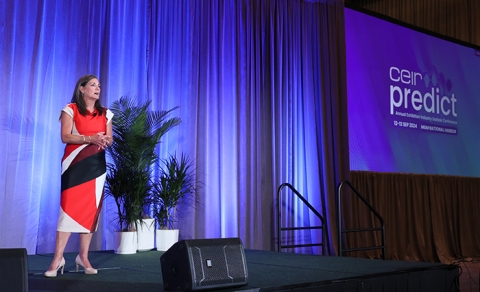
This year’s CEIR Predict Conference brought together forward-thinking executive leaders to deliver crucial insights on global trends, AI innovation and strategic planning. The event featured leading AI innovators, economists, business intelligence specialists, and political analysts who collaborated with industry experts to provide a comprehensive outlook on the exhibition industry's future.
Economic and Geopolitical Insights
Adam Sacks, president of Tourism Economics at Oxford Economics Company, delivered a compelling analysis of the CEIR Index and its implications for different market sectors. His presentation detailed how the exhibition industry could leverage CEIR data for strategic decision-making, while providing valuable insights into current economic conditions and their impact on exhibitions.
“Up to 75% recovered in 2022, 89% in 2023, and for the first half of this year, we've eked out another couple percentage points, about 91% recovered," Sacks pointed out. “Again, the value proposition of the exhibition industry, of gathering for business and for trade, face-to-face is as completely indispensable as it ever has been.”
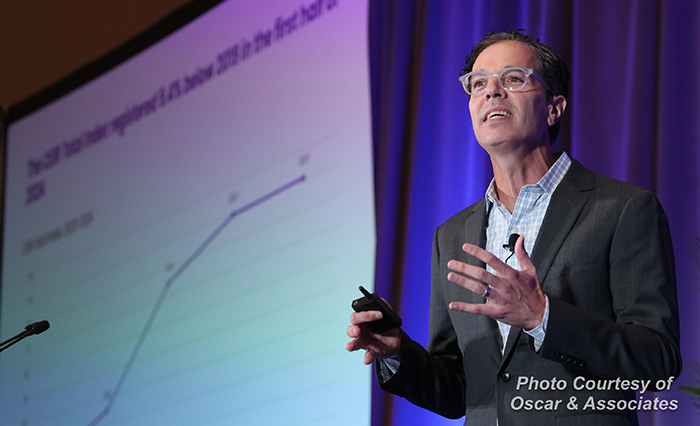
Dane Chamorro, partner at Control Risks and head of Global Risk Analysis and Business Intelligence for the Americas, offered a thorough examination of the complex risks facing U.S. businesses. His session explored how political tensions, economic uncertainties, and technological disruptions affected the exhibitions industry, focusing on supply chain challenges, regulatory changes, and market volatility.
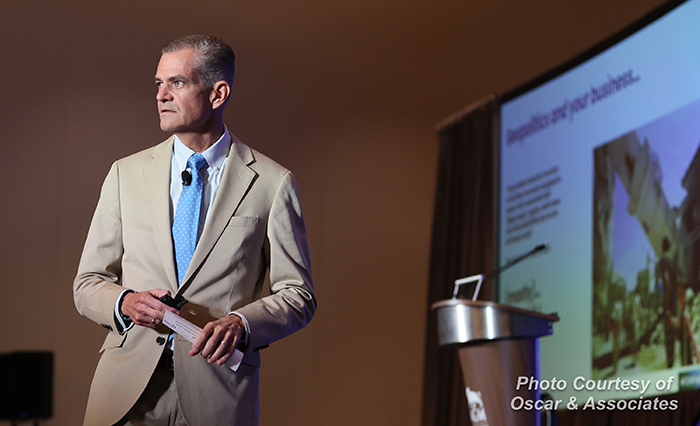
“The pandemic didn't really create new trends, but it accelerated trends that were already happening,” Chamorro said. “It’s not revolution, it’s not that fast and it’s not evolution, it’s not as slow – it's somewhere in between. And from a business perspective, what this means is you have all of these things happening at once.”
Risk Assessment and Future Planning
Matt Carmichael, senior vice president at Ipsos' Global Trends & Foresight and editor of What the Future, presented a comprehensive framework for understanding and preparing for industry risks. His session equipped attendees with practical tools and methodologies used by futurists to create planning scenarios and assess potential risks, while addressing the importance of brand image and reputation management.
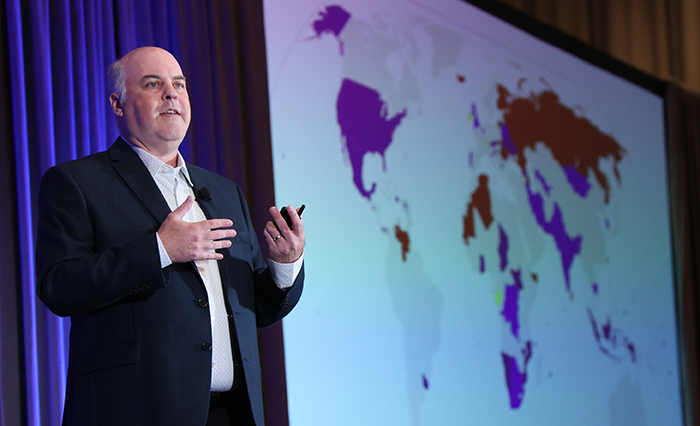
“You have to know your audience,” Carmichael explained. “How you talk about research with an innovation team is different than how you talk about it with a creative team or a marketing team. It’s different than how you talk about it with your ‘C-suite.’ These people all have different things they are concerned about and need a slightly different story. The baseline can be similar, but it’s important to know how you pivot that to really connect with the folks you are trying to get your research in front of and you have to do that work.”
AI Innovation and Implementation
The conference featured two significant sessions on artificial intelligence. Noelle Russell, founder and chief AI officer of the AI Leadership Institute, showcased how AI was transforming the exhibitions and events industry. Her presentation highlighted more than a dozen AI models that could enhance business operations and drive growth, while addressing ethical considerations and emphasizing AI's role in supporting human creativity.
Russell stressed that, “A model doesn't know truth. It doesn't know humanity. It only knows how to create a good answer that you will look at and go, ‘Well, that's pretty good,’ but it doesn't know if it’s truthful – you know if it’s truthful. It’s called human feedback, reinforcement learning with human feedback. ‘Machine learning’ is a term, but it means you’re – meaning you specifically and the teams that work for you – are critical to the process.”
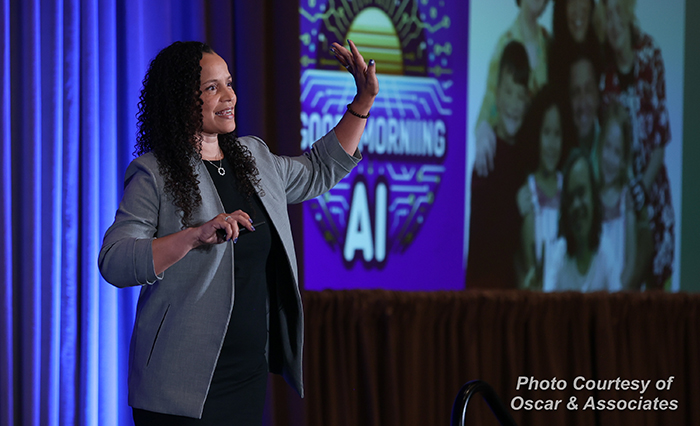
Sean Watson, futurist and senior vice president of Special Projects at Trend Hunter, provided a detailed analysis of the ongoing AI revolution. His keynote examined real-world AI applications and their impact across various sectors, offering attendees practical insights on leveraging technology to maintain competitiveness in the digital age.
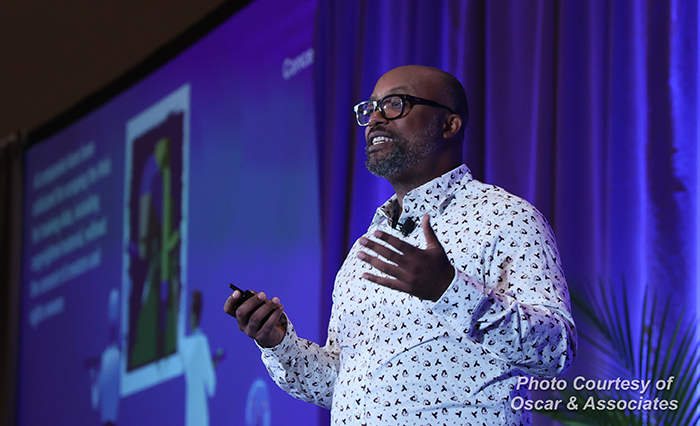
“AI’s evolution outpaces historical tech, showcasing vast transformative potential across sectors,” noted Watson. “Today, 59% of CEOs are investing in digital/automated workflows as their No.1 strategy. 51% are now investing in AI, significantly ahead of robotics (which was the burgeoning technology). Nearly all CEOs and decision-makers (97%) say they believe AI will play a large role in their future operations.”
Political Landscape and Electoral Impact
Chris Jackson, senior vice president of U.S. Public Affairs and Public Polling at Ipsos, delivered a timely analysis of the global political landscape, with particular emphasis on the upcoming U.S. presidential election. His presentation included detailed predictions for various electoral outcomes and their potential impact on the trade show industry, providing organizers with valuable insights for strategic planning.
In detailing Ipsos research on consumer sentiment, Jackson noted, “Americans are increasingly looking to the public sector to solve problems. Most Americans do not use their values to determine who they will do business with, but there is a definite difference by income or education level where the more educated/affluent people are, the more likely they are to have values-driven consumer behavior. This matters when it comes to who you’re talking to and what you’re trying to put on.”
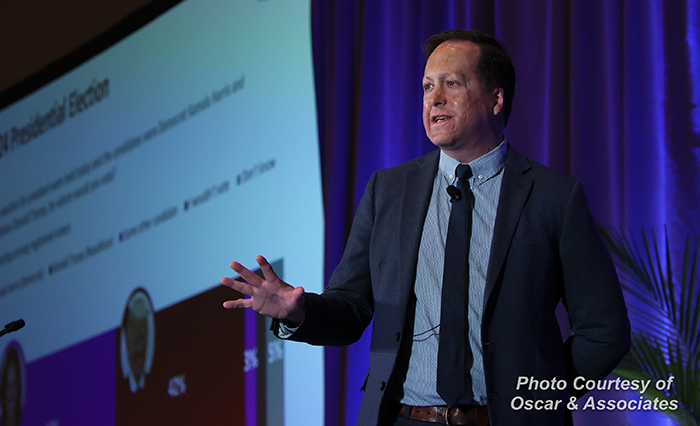
He continued, “You’re going to start to get these pressures to do things that are maybe outside of your core missions because people are looking to the private sectors to solve problems. However, when we ask people if they want to see brands engaging explicitly in political behavior, most Americans say ‘no.’ So this is that delicate balance you’re having to fight where you’re being pressured to take stands and do things about problems in society, but you can’t be too political.”
The conference concluded with a thought-provoking keynote from Dr. Sam Potolicchio, president of Preparing Global Leaders Forum and founding executive director of the Center for Global Leadership at American Councils. His presentation encompassed a wide range of global issues, from political and social developments to environmental challenges. He also reviewed his predictions from the previous year, analyzing which forecasts had materialized and which had taken unexpected turns.
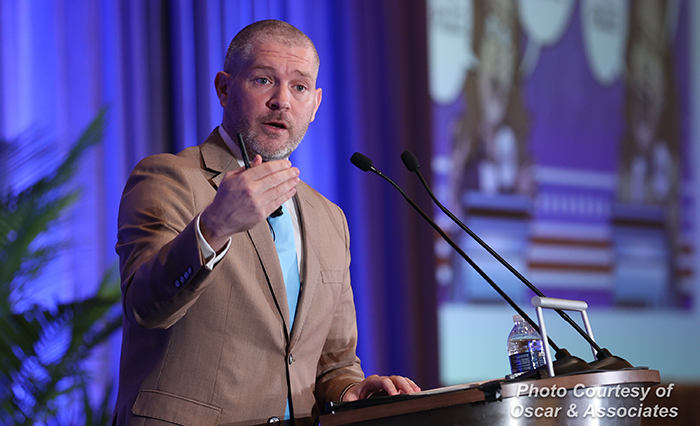
“Expressing probabilities does two things,” Potolicchio commented. “Number one, you have the intellectual humility there, but then number two, you continue to seek out and update your probabilities by trying to get more information or more data. And this is one of the reasons I think CEIR [Predict] is such an effective event – giving you this hard data, these empirics, and making this annual pilgrimage to update your models and think about where things are going.”
Save the Date
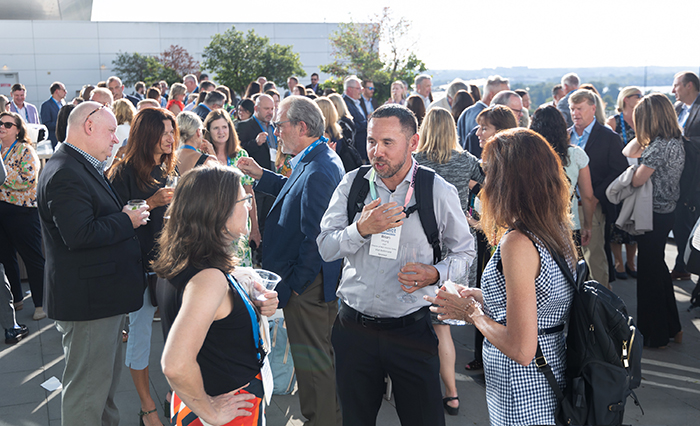
CEIR’s 2024 Predict Conference successfully provided attendees with actionable insights and strategic perspectives to help them navigate the rapidly evolving business landscape. The event demonstrated the exhibition industry's commitment to embracing innovation, understanding global trends, and preparing for future challenges and opportunities.
The 2025 Predict Conference will take place September 11-12 at the MGM National Harbor in Oxon Hill, Md. Stay tuned for more details here.
Main image: IAEE President & CEO Marsha Flanagan speaking at Predict. Photos courtesy of Oscar & Associates.
Don’t miss any event-related news: Sign up for our weekly e-newsletter HERE, listen to our latest podcast HERE and engage with us on LinkedIn!


Add new comment